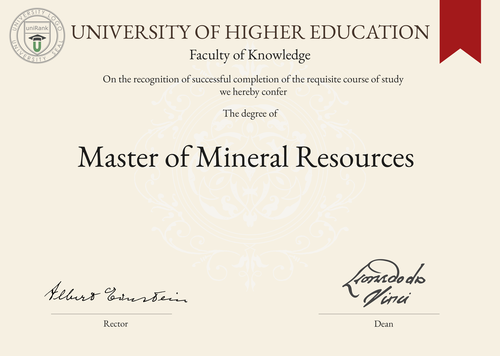
Master of Mineral Resources (MMR)
Guide to University Programs/Courses
Master of Mineral Resources (MMR)

Program/Course Name
Master of Mineral Resources
Program/Course Abbreviation
MMR
Duration Range
1-2 years
Tuition Range (US, UK, AUS, NZ)
$10,000-$50,000 per year
Overview
The Master of Mineral Resources degree is a postgraduate program that focuses on the exploration, extraction and processing of minerals. This degree is designed to provide students with the knowledge and skills necessary to work in the mining industry. Students will learn about the geology of mineral deposits, mining methods, mineral processing and environmental management.
Curriculum Overview by Year
- Year 1:
- Introduction to Mineral Resources
- Geology of Mineral Deposits
- Mining Methods
- Mineral Processing
- Environmental Management in Mining
- Year 2:
- Advanced Mineral Exploration
- Mine Planning and Design
- Mine Safety and Health
- Mineral Economics and Finance
- Research Project
Key Components
The key components of the Master of Mineral Resources degree include:
- Understanding the geology of mineral deposits
- Learning about mining methods and mineral processing
- Developing skills in environmental management in mining
- Exploring advanced mineral exploration techniques
- Gaining knowledge in mine planning and design
- Understanding mineral economics and finance
- Conducting a research project
Career Prospects
Graduates of the Master of Mineral Resources degree can pursue careers in the mining industry as:
- Mining engineers
- Mineral processing engineers
- Exploration geologists
- Mine planners
- Environmental managers
- Mineral economists
Salary Expectations
The salary expectations for graduates of the Master of Mineral Resources degree vary depending on the job and location. According to Payscale, the average salary for a mining engineer is $76,000 per year, while the average salary for an exploration geologist is $87,000 per year.
For a more accurate understanding of salary expectations, you can utilize the Job Sites Search Engine, from our sister site jobRank, which searches over 4,600 job sites worldwide. Make sure to specify not only the job title but also the country you are interested in.Conclusions
The Master of Mineral Resources degree is a valuable postgraduate program for those interested in pursuing a career in the mining industry. However, it is important to note that the duration, tuition fees, curriculum, key components, career prospects and salary expectations can vary depending on the country and university where the degree is studied. Visitors can search for where this specific degree is offered anywhere in the world through the uniRank World Universities Search Engine.
World Universities Search Engine
search for Master of Mineral Resources (MMR) and add the Location (country, state etc.) or specific University you are interested in studying at.
Query examples:
- Master of Mineral Resources (MMR) United States
- Master of Mineral Resources (MMR) United Kingdom online
- Master of Mineral Resources (MMR) Australia international students
- Master of Mineral Resources (MMR) University of California
- Master of Mineral Resources (MMR) University of London tuition fees
- Master of Mineral Resources (MMR) University of Sydney scholarships